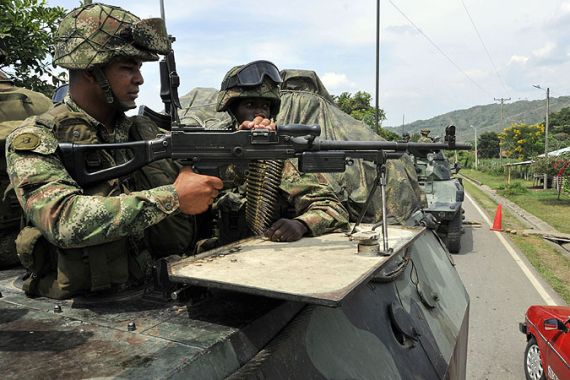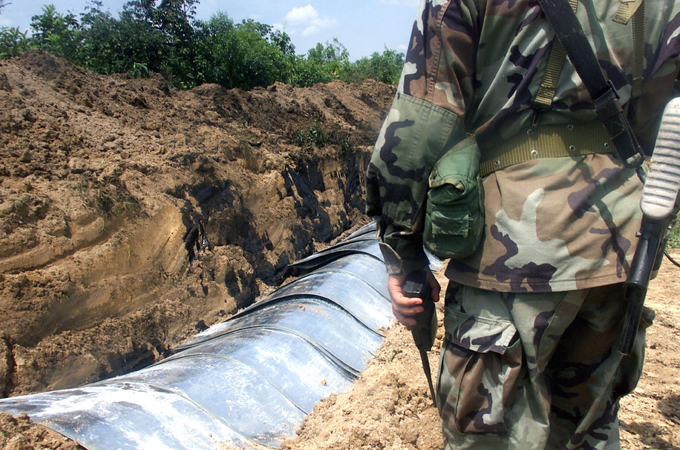Oil workers released in Colombia
Colombian troops free all but one of 23 local oil contractors abducted by suspected FARC rebels in remote jungle region.

 |
| Illegal armed groups remain a threat in areas where the state’s presence is weak [File: GALLO/GETTY] |
Colombian troops have secured the release of 22 of 23 employees of a Canadian oil firm abducted in the east of the country.
| In Depth | |||||||||||||||||
|
“We still don’t know the details of how the releases took place, but pressure from army troops in the area led to the release,” Juan Carlos Avila, governor of the Vichada province, said on Tuesday.
The workers, who were employed by a subcontractor for Canada’s Talisman Energy, were abducted by suspected rebels on Monday.
Troops on foot and in helicopters were pursuing the kidnappers in the remote eastern jungle region, some 600km east of the capital Bogota, to free the remaining hostage, Colombia’s minister of defence said.
“We can confirm that 22 of the 23 are now freed, however, one contractor remains captive,” Rodrigo Rivera told local Caracol Radio.
The government had earlier said 19 of the workers had been freed.
Talisman said most of the workers were members of local indigenous communities hired by a contractor to carry out seismic work in the area.
The Colombian army said the gunmen appeared to belong to a local unit of the Revolutionary Armed Forces of Colombia, or FARC, Latin America’s oldest surviving rebel insurgency.
FARC operations
The FARC operate in Vichada province along with illegal cocaine-trafficking gangs, in the oil-rich flatlands of eastern Colombia near the Venezuelan frontier.
Kidnappings have become more rare in Colombia as security has improved, but Monday’s large-scale hostage-taking shows the risks still facing the oil and mining firms. Companies are still targeted for extortion by armed groups.
The FARC still kidnap for ransom but they are also holding around 15 police and soldiers hostage for political leverage.
 |
It was the first mass kidnapping since president Juan Manuel Santos, a former defence minister, came to office in August.
Colombia, Latin America’s number four oil producer, has enjoyed a boom in oil and mining investment as violence from its long war has subsided, but illegal armed groups remain a threat in remote areas where the state has yet to gain a strong hold.
The country’s oil infrastructure has also been attacked recently. Last month, the Cano Limon-Covenas pipeline was attacked and earlier the Transandino oil line was halted for a few days by a suspected rebel bomb.
Last month, a coal rail line operated by the coal producer Cerrejon was also hit by a bomb in a second attack on the installation in a month.
Once written off as a failing state mired in drug violence, Colombia has enjoyed a sharp decline in bombings, kidnappings and attacks since 2002, when the government began a US-backed security crackdown on armed groups.
Foreign investment grew more than five-fold as violence waned and oil and mining companies moved into areas once considered off limits for exploration.
However, the FARC and cocaine-smuggling groups linked to former paramilitaries are still proving resilient in remote jungles, mountains and flatlands, where the Colombian state has yet to establish a strong foothold.
